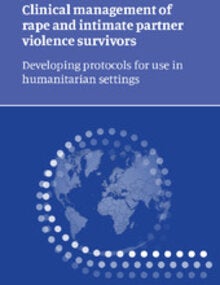Clinical management of rape and intimate partner violence survivors: developing protocols for use in humanitarian settings

|
OverviewSexual violence and intimate partner violence (IPV) – which may be physical, sexual and/or emotional/psychological – are global problems, occurring in every society, country and region. In humanitarian settings, as a result of mass displacement and the breakdown of social protections, women and children who are refugees, internally displaced persons (IDPs), or otherwise affected by conflict-related or natural humanitarian crises, are at increased risk. The high rates of sexual violence and IPV are well documented and constitute a serious violation of international humanitarian law and human rights law. This guide is intended for use by qualified health-care providers (medical doctors, clinical officers, midwives and nurses) who are working in humanitarian emergencies or other similar settings, and who wish to develop specific protocols for the medical care of survivors of sexual violence and IPV. This guidance will need to be adapted to each setting, taking into account available resources, materials, medications, and national policies and procedures. It can also be used to update existing protocols, to help plan and provide services and train health-care providers. NEW: Updated eLearningPurpose: To provide step by step guidance for best practices in clinical management of rape and intimate partner violence survivors Audience: Health care providers Developed by: UNFPA, UNHCR and WHO to meet needs for those working in humanitarian settings
|
